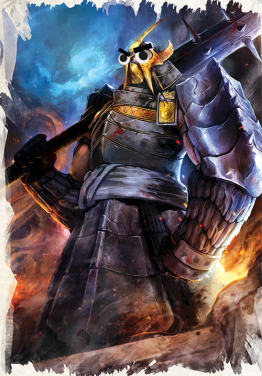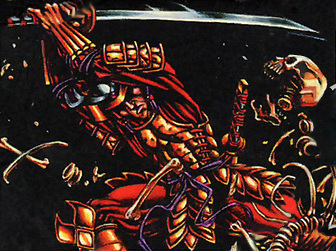Hello and Welcome back to Wardens of the Midwest!
Joe From Cincinnati here once again and ready to get back to the second part of this wonderful article about the Magnificent Crab Clan. If you are interested in reading the first part of this article (which you should, cuz it’s great), you can find the article here.
I already did the introduction in the first part, so let’s jump right into the meat of the article. The 2nd point we were about to cover last time was how Crab controls their opponent’s honor.
2. Control Their Honor
Crab has the advantage of having a good amount of card draw that does not rely on the draw phases’ bid dial. They have Shrewd Yasuki for filtered card draw as long as there is a holding in play (doesn’t have to be yours). They have Kaiu Envoy, who gives you a card (and a fate) when he leaves play (of which Crab has multiple productive ways to utilize, such as Way of the Crab, Funeral Pyre, Steadfast Witch Hunter and Stoic Gunso). They have Funeral Pyre to discard a bowed fateless character (that has served their purpose) to draw a card and they also are able to run multiple Imperial Storehouses in addition to their other holdings due to their inherent synergies with holdings.
This non-bid card draw allows Crab to bid very low for the entire game (typically 2 to 3 max) and still maintain a solid, varied hand. Because of this capability, they are able to pressure their opponent’s honor early on. If you bid 1 and your opponent bids 5 on turn 1, they are already down to ~6 to 8 honor before the conflict phase of the first turn even begins. This makes it so that they probably cannot afford to use events like Assassination, Banzai’s second trigger and other honor losing card effects that have a high impact on the game. This is further amplified by the Unicorn splash that utilizes Spyglass for more card draw (And The Mountain Does Not Fall and Favorable Ground to get that character with the Spyglass into multiple conflicts per turn for even more draw).
If you are controlling their board properly, as in the first part of this article, Intimidating Hida will also contribute to honor control. It is very difficult to participate in all 4 conflicts when your board is constantly under threat of being wiped each turn. So, if you are keeping your opponent’s board thin, they likely cannot afford to declare both conflicts in addition to defending your conflicts each round. Intimidating Hida removes an honor from them for not declaring both conflicts. Or, if they declare 2 conflicts and don’t defend your conflicts, they lose an honor for allowing an unopposed conflict. So…win win.
While I don’t personally run it in this particular deck because of deck space and relative impact, if you want to really pressure your opponent’s honor, Levy is also fairly powerful in that regard. If your opponent doesn’t have any fate remaining, which isn’t uncommon early in the game, Levy can steal an honor from them; the equivalent of an additional Ring of Air conflict. The main reason I don’t include it is because, if my opponent is ever below 5 honor, they’ll typically keep fate to stop Levy from taking honor. Free fate is fantastic, but having a card not do what you truly want it to do doesn’t feel very rewarding. And since the opponent chooses the effect of Levy, they’ll always give you the worse of the two options in the scenario that you play it, assuming they have a fate to give you. Its conditional nature is amplified further because it is a card that doesn’t help you win conflicts, so top decking it when you need an answer to your opponent’s board/conflict declaration can be back breaking. As a general rule, I try to limit the number of cards I have in a deck that don’t contribute to winning a conflict, due to the unpredictable nature of card draw in this game (since you draw after you purchase your characters).
Pair these cards and strategies with the card Watch Commander to make each and every card they play cost them more honor. If you have Hida Kisada on the board and a Watch Commander (or 2) in a conflict, your opponent is basically forced to not use any cards from hand, or else hemorrhage honor at an extremely fast pace. Kisada is relevant here because, if they want to use any actions, they first must “waste” an action to account for Kisada’s cancel effect. That means they have to either use an on-board effect, like their stronghold or a character ability, to soak Kisada’s cancel, or spend a card that then does nothing. If they don’t have any on-board abilities, or if they aren’t willing to waste them because they want to use them during that conflict, they must spend cards and, because of Watch Commander, honor to get around that action cancel. Which ties perfectly into the next section.
One final thing I think is worth noting in regards to controlling your opponent’s honor. As I mentioned above, Assassination is a very powerful effect in this game. It allows you to remove the characters standing between your opponent’s big characters and your Way of the Crab. It’s so powerful in fact that, in the core set environment, it is run to some degree in nearly every deck list that I’ve seen and played against. How can you beat character removal? It is important to note, however, that it costs 3 honor to use. The good news is that when you’re bidding relatively low and taking honor from your opponent during the bid phase, the honor they are giving you is more or less funding your Assassinations.
In addition, if you can bait your opponent into using an Assassination, then you are going to pressure their honor a lot more easily than if they use no honor losing card abilities. How do you bait an Assassination? Well, luckily, Crab has one of the most assassinate-able characters in the entire game in Hiruma Yojimbo. That character is so damn efficient it’s ridiculous. She’s a 4/3 for 2 fate that, while you can’t declare her as an attacker, you can Charge! her into a military conflict or move her into a conflict with a Favorable Ground. So, often times, I’ve found that 1 fate on a Hiruma Yojimbo is often a large enough incentive to make your opponent assassinate her. If not that, then maybe 1 buff (a Banzai, Ornate Fan or Fine Katana) should do the trick. If they assassinate her, you just got 3 honor closer to winning the game. If they don’t assassinate her, you have a super efficient defender that is worth way more stats than her cost! It’s another win-win!
3. Control Their Hand
This is a much shorter explanation. Spies at Court is amazing when combined with Ring of Earth to pull 3 cards out of your opponent’s hand. That, along with the honor pressure that makes them want to bid low to not throw away honor, means your Spies at Court could take out as much as half their hand (if not their whole hand.) It is a little more difficult to pull off against stronger political clans, such as Crane and Scorpion. However, with some smart play, such as playing an unexpected Iuchi Wayfinder from hand once they’ve bowed all their characters in the previous 3 conflicts, you can typically get a political conflict through to help thin their hand.
In addition, the aforementioned Kisada compels your opponent to waste cards or on-board abilities, which is great for hand control, especially when they forget about Kisada’s text (which they will. Even elite players forget passive text) and waste a high impact effect like Court Games or Assassination. I compare Hida Kisada’s ability to the plot, For the Watch!, from A Game of Thrones. If I had a nickel for every time my (good) opponents would accidentally commit more characters to that first challenge, despite not being able to win. Passive, consistent effects can easily be forgotten by your opponent and can have disastrous consequences in an environment that doesn’t allow for takesies backsies (Like a tournament, for example). So, once they declare an action that is cancelled by Kisada you are, by rule, allowed to decline them the right to take the action back, if you so choose, once they realize that Kisada cancelled it. And as long as you keep winning conflicts, Kisada cancels the first ability effect of each conflict. That can compound quickly, especially when you’re first player, since it’s typically easier to win on offense than it is on defense. In my top 16 match in the Discord League Tournament, my opponent remembered Kisada’s effect in the first conflict that I initiated and properly used his stronghold to “soak” the cancel. However, I won that conflict and then, in the second conflict of the round, he forgot about it and used a Court Games, which ended up being cancelled.
Tell Us More About Your Chosen Splash, Joe!
In my previous iteration of this article (which I didn’t publish), I was using the Phoenix splash because Display of Power is a fantastic control card in that it basically cancels your opponent’s ability to recover from any control you’re exerting over them. They try to use the Ring of Void to deny your from using it to control their board? Display of Power. They try to use the Ring of Air to regain some honor to get out of the danger zone? Display of Power. They try to use the Ring of Earth to regain control of their hand? Display of Power.
The problem is…event cancels are a thing in this game. And they cost 0 fate. So, as long as your opponent has the requirements to trigger the cancel (more honored characters for Voice of Honor, a courtier to dishonor for Forged Edict), you can’t ever really feel safe playing an event like Display of Power. And, since it requires that you lose a conflict unopposed and spend 2 fate to play it, you could be down a province (because it’s not hard for your opponent to get 4 or 5 strength in a conflict when its unopposed), an honor (for allowing an unopposed conflict), 2 fate (the cost of the card) and the card itself out of hand and all it would cost your opponent is a card from hand and maybe having to dishonor a single character. Not a great trade, in my opinion.
(Side note/hot take: I think the event cancels in this game are too powerful. They should have at least cost 1 fate, so that they were forecast-able, like Hand’s Judgment is in A Game of Thrones. These cancels are not only difficult to predict, due to the 0 fate cost, but it also makes high cost events, objectively, less useful than low cost events, which seems completely backwards to me. I feel the same way about Let Go and high cost attachments. An expensive event or attachment should be more safe to play, not less safe, but that’s an entire article topic in itself.)
For that reason, instead of going the route of Phoenix splash, which is arguably a better fit for this kind of play style, I decided to go with Unicorn splash. But don’t worry! There is still plenty of great cards to splash from Unicorn that make up for the loss of Display of Power. The first one is Captive Audience, which covers one of Crab’s weaknesses: vulnerability to strong political clans. Switching a political conflict to a military conflict at any time can be extraordinarily powerful, especially since Crab has multiple characters with more military strength than political strength (such as Kisada, a 7/2, and Intimidating Hida, a 4/2.) Switching the conflict to military can very easily give you a big advantage in that conflict (your 4/2 vs their 1/3 goes from a 1 strength deficit to a 3 strength advantage for you), and it also potentially turns off (or on) certain cards and abilities that are restricted to the two different conflict types. I remember in one of my games against Dragon, they attacked in with the Kitsuki Investigator, which can pay a fate to an unclaimed ring during a political conflict to look at your hand and discard a card (Seen in Flames, for Thrones players), and my first action, as defender gets first action, was using Captive Audience to switch the conflict to military. This not only weakened his attack by 2 strength (the investigator is a 1/3), but it also turned off that ability that would have been very painful to have to deal with. In addition, it turns on Charge! and Banzai to help you win conflicts that you ordinarily would not have been able to (or would not typically want to) play in that conflict type.
Spyglass, as I mentioned in the second point, is great for drawing multiple cards, which helps you pressure dishonor by allowing you bid lower and maintain a good sized hand. It even gives a strength in political, which is a nice little bonus to the already strong card effect. And, finally, the Iuchi Wayfinder is a solid 1 cost character that can not only look at one of your opponent’s unrevealed provinces (which potentially prevents the unlucky face check of a Shameful Display or other powerful province effect) but can also be used to further fuel the sacrifice engine that is so good in Crab’s theme (Stoic Gunso, Funeral Pyre, Steadfast Witch Hunter etc but not Way of the Crab, as it requires a Crab character be sacrificed). Also, unexpected defenders or attackers can prevent and cause unopposed conflicts (you are second player, they do both of their attacks, you defend with all of your characters, then play this guy for a quick free attack at the end of the conflict phase) that will fuel every control option you are trying to exert on your opponent, including a potential honor loss to your opponent for allowing an unopposed conflict.
And I can see the Unicorn splash getting even more powerful in the future. As we saw in the 6 packs in 6 weeks announcement article, Unicorn is getting the card, Talisman of the Sun, which allows you to, as the defending player, move the conflict to another one of your provinces. They do a weak conflict into your Manicured Gardens? Take the fate as your first action, and then move it over to your Defend the Wall and win on defense, triggering the ring. They attack with a high glory character? Move them over your Shameful Display and dishonor them (and also honor one of your characters). They attacking your stronghold and it looks like they’re going to break it? Move them to your 4th province (which is almost always not broken, since you only need to break 3 provinces to get access to the stronghold province) and let them win, with little position lost.
Aaaaand first article in the books! I hope you all enjoyed it and I hope it helped new Crab players learn a few things about the play style that I use for this clan. I also have a Youtube Channel where I intend to post gameplay videos of myself and possibly others playing this game in the future here:
https://www.youtube.com/channel/UCANGv5_alwyAdmW9nUAvMrA/videos?view_as=subscriber
I also have a playlist of 8 games that I’ve played (not all of them are on my Youtube Channel, hence the playlist) that you can find here:
https://www.youtube.com/playlist?list=PLeq0U255zGKSfRsl8T0-s621Xy93iv3Tn
Until next time, folks! 🙂





